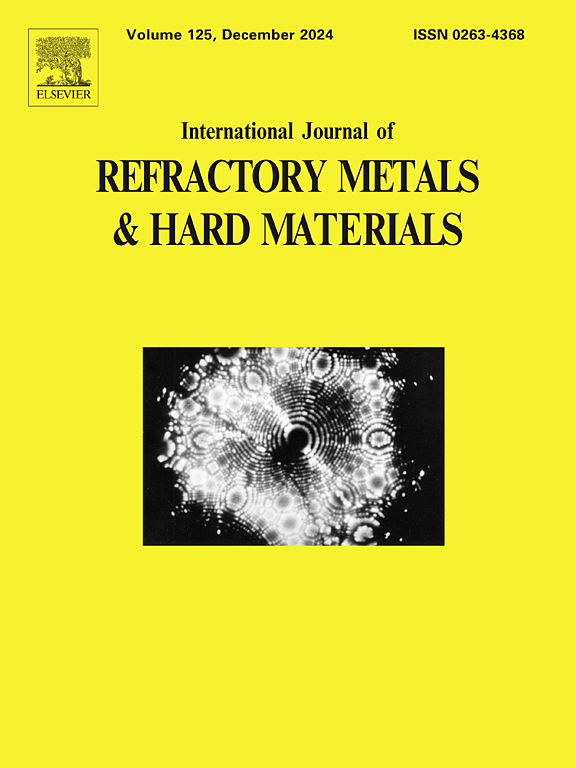Enhanced wear resistance and fracture resistance of spherical WC reinforced nickel-based alloy coating by adding non-spherical WC
IF 4.2
2区 材料科学
Q2 MATERIALS SCIENCE, MULTIDISCIPLINARY
International Journal of Refractory Metals & Hard Materials
Pub Date : 2024-11-07
DOI:10.1016/j.ijrmhm.2024.106951
引用次数: 0
Abstract
Spherical WC particles are widely employed as hard phases to reinforce metal matrix coatings; however, their deposition during the surfacing process presents a significant challenge, resulting in limited improvements in coating hardness and wear resistance. In this work, these spherical WC as well as spherical/non-spherical WC particles have been used to prepare the WC reinforced nickel-based alloy coatings. The microstructure, mechanical, wear and fracture behavior of these coatings were investigated by detailed characterization. Results showed that spherical WC exhibited rapid sedimentation, and the primary decomposition products existed lump-like W2C. The ultimate decomposition process was based on the exfoliation of the diffusion layer. The spherical WC/Ni coatings exhibited a hardness of 13 GPa and an elastic modulus of 253 GPa, respectively. Notably, the wear rate of these coatings was relatively high, measuring 7.038 × 10−6 mm3/(N·m), while the stress and strain were comparatively low, standing at only 272.5 MPa and 0.72 %. In contrast, spherical/non-spherical WC/Ni coatings demonstrated distinct differential sedimentation behavior. Spherical WC particles settled at the bottom of the coating, whereas non-spherical WC particles were dispersed in the middle and upper regions. The decomposition of non-spherical WC particles was governed by the dissolution and diffusion of W2C, forming a skeleton-braided structure of M7C3, γ, and M23C6 phases on the coating surface. This unique structure increased the hardness of the coating to 21 GPa and the elastic modulus to 369 GPa, while reducing the wear rate to 2.853 × 10−6 mm3 (N · m) −1. In addition, the stress and strain reached 497.10 MPa and 1.97 % respectively, shifting the fracture mode to quasi-cleavage fracture with tear ridges. Overall, the spherical/non-spherical WC/Ni coating exhibited improved deformation resistance and superior wear resistance.
通过添加非球形碳化钨提高球形碳化钨强化镍基合金涂层的耐磨性和抗断裂性
球形碳化钨颗粒被广泛用作强化金属基涂层的硬质相;然而,它们在堆焊过程中的沉积是一个重大挑战,导致涂层硬度和耐磨性的改善有限。在这项工作中,这些球形 WC 以及球形/非球形 WC 颗粒被用来制备 WC 增强镍基合金涂层。通过详细的表征研究了这些涂层的微观结构、机械性能、磨损和断裂行为。结果表明,球形 WC 表现出快速沉降,初级分解产物为块状 W2C。最终的分解过程基于扩散层的剥离。球形 WC/Ni 涂层的硬度和弹性模量分别为 13 GPa 和 253 GPa。值得注意的是,这些涂层的磨损率相对较高,为 7.038 × 10-6 mm3/(N-m),而应力和应变相对较低,仅为 272.5 MPa 和 0.72 %。相比之下,球形/非球形 WC/Ni 涂层表现出明显的沉降行为差异。球形 WC 颗粒沉降在涂层底部,而非球形 WC 颗粒则分散在中上部区域。非球形 WC 颗粒的分解受 W2C 的溶解和扩散影响,在涂层表面形成了由 M7C3、γ 和 M23C6 三相组成的骨架编织结构。这种独特的结构将涂层的硬度提高到 21 GPa,弹性模量提高到 369 GPa,同时将磨损率降低到 2.853 × 10-6 mm3 (N - m)-1。此外,应力和应变分别达到 497.10 兆帕和 1.97 %,断裂模式转变为带撕裂脊的准脆性断裂。总体而言,球形/非球形 WC/Ni 涂层具有更好的抗变形能力和更优越的耐磨性。
本文章由计算机程序翻译,如有差异,请以英文原文为准。
求助全文
约1分钟内获得全文
求助全文
来源期刊
CiteScore
7.00
自引率
13.90%
发文量
236
审稿时长
35 days
期刊介绍:
The International Journal of Refractory Metals and Hard Materials (IJRMHM) publishes original research articles concerned with all aspects of refractory metals and hard materials. Refractory metals are defined as metals with melting points higher than 1800 °C. These are tungsten, molybdenum, chromium, tantalum, niobium, hafnium, and rhenium, as well as many compounds and alloys based thereupon. Hard materials that are included in the scope of this journal are defined as materials with hardness values higher than 1000 kg/mm2, primarily intended for applications as manufacturing tools or wear resistant components in mechanical systems. Thus they encompass carbides, nitrides and borides of metals, and related compounds. A special focus of this journal is put on the family of hardmetals, which is also known as cemented tungsten carbide, and cermets which are based on titanium carbide and carbonitrides with or without a metal binder. Ceramics and superhard materials including diamond and cubic boron nitride may also be accepted provided the subject material is presented as hard materials as defined above.

 求助内容:
求助内容: 应助结果提醒方式:
应助结果提醒方式:


